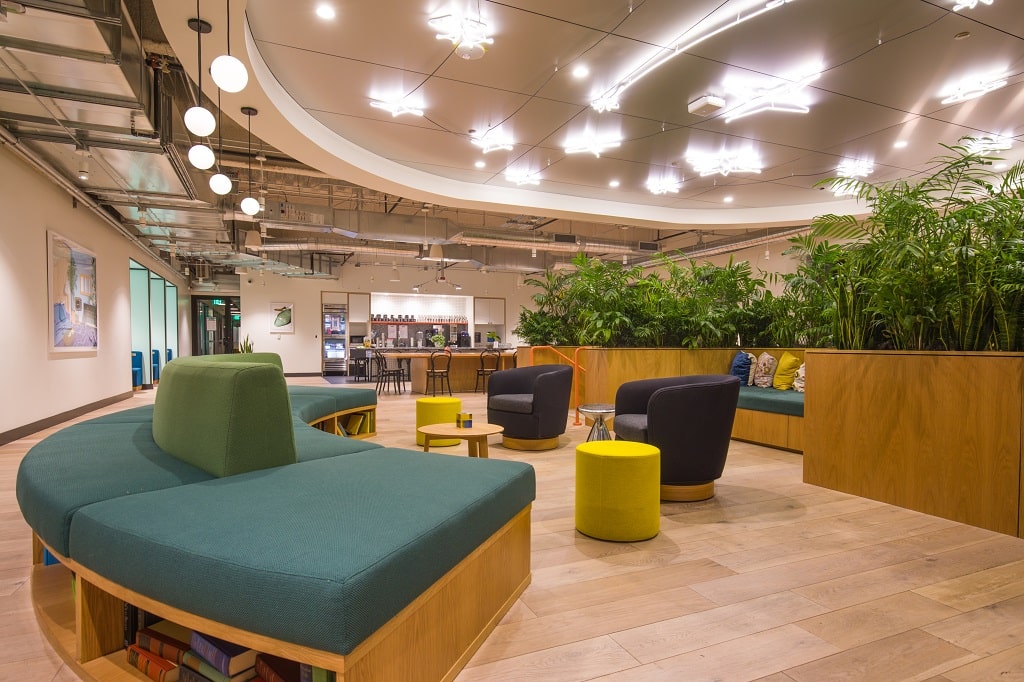
Following the pandemic there has been a huge surge in demand for flexible office spaces that suit the needs of the modern workforce. These offices need to cater to hybrid work practices while still providing meeting rooms, conference rooms, kitchen areas, and other communal areas. But how do you work out how much space you actually need? In this blog, we’ll take you through the ins and outs of calculating your office space needs.
Calculating space per employee
In traditional open plan offices, an allocation of 100 sq ft per employee was commonplace, this allowed for 50 sq ft of desk space and a further 50 sq ft of communal space per employee. For hybrid working where your office is rarely fully staffed you can go even lower with around 75 sq ft per person of space providing a more collaborative, coworking space.
For businesses who want to have cubicles or private offices then you will need to double the space per person to around 200 sq ft which will allow for much more desk space, bigger communal and collaborative working areas, and private offices.
Essential office amenities
In addition to the space your staff need to do their job you also need to think about how much space you need for the different amenities in your office. The below provides a rough idea of how much space different amenities take up.
- Small meeting room (2 – 4 people) = 100 sq ft
- Large meeting room (4 – 8 people) = 150 sq ft
- Board room (15 – 20 people) = 220 sq ft
- Kitchenette = 100 sq ft
Office layout
When looking at office spaces you need to look beyond the numbers and look at the layout plans for the office. Awkward layouts can hinder how you use the space and make it impossible for you to fit in enough desks, meeting rooms, or communal areas for your staff. Make sure you take the time to look at floor plans for any space you consider and use this as a basis for drawing up a shortlist of properties to visit in person.
What are the other considerations?
In addition to the essential amenities and desk space that you need for each employee you’ll also want to consider a few things when choosing your new office space. These include:
- Company growth – does your new office give you enough room to grow.
- Traditional lease vs flexible lease – flexible leases give you a lot more freedom.
- Fully managed offices – these include security, cleaning staff, free parking, and maintenance staff as part of the lease.
- Shared or private space – for new businesses having a shared workspace with other companies can help to provide you with networking opportunities.
Interested in hiring a flexible office space for your business? Find out more about our fully managed office units and flexible business solutions here.
Benefits of renting an industrial unit for your small business
If you are looking to grow your cottage industry or small business beyond your home, then renting a commercial property could be the next logical step. An industrial unit is a great match for any business that is looking to increase their storage capacity and their ability to scale production. In this blog we’ll run through some of the benefits of renting an industrial unit and how it can help your business to grow.
Low upfront costs
One of the biggest advantages of renting an industrial unit is that the upfront costs will be much lower than if you were to purchase a unit to suit your needs. Purchasing will often involve a range of additional fees including solicitors, agents, surveys, and additional taxes. In comparison renting an industrial unit has a much lower barrier to entry, making it easier for small businesses to rent the space they need.
Flexible terms
An increasing number of retail and business units are offering flexible terms and easy-in, easy-out leases. This makes them the ideal choice as you can scale your business as and when you grow without being stuck in a long-term lease. Many industrial units for rent, such as those at Harlow Business Centre, include a range of other features including regular security patrols, 24-hour CCTV, refuse collection, and free parking for your business and visitors.
No repair or maintenance costs
Another big reason to rent instead of buy when it comes to industrial units is that your premises will be maintained and kept to a good standard of repair by your landlord. This can save you some serious money on the regular upkeep on a commercial property and if any issues should crop up, there is normally an on-site maintenance team available to resolve any problems.
Prime location
Industrial units offer the perfect location for businesses that are looking to grow and expand their services. With easy access to transport links and courier services you can focus on building up your business without having to worry about the logistics of where staff can park, deliveries, or security.
Expandable space
Found that your business is growing quicker than you thought it would? When you rent an industrial unit on a flexible lease it becomes much easier to expand, often with units available on the same estate. Whether you move to a bigger unit or take an additional unit is up to you, but renting an industrial unit gives you the freedom to expand when you need to, and also stop leasing space when you no longer need it.
Interested in hiring a flexible an industrial unit or warehouse for your business? Find out more about our fully serviced industrial units here.